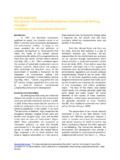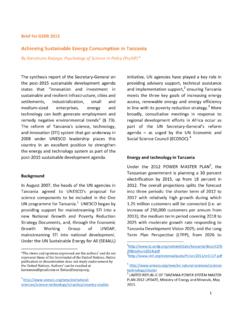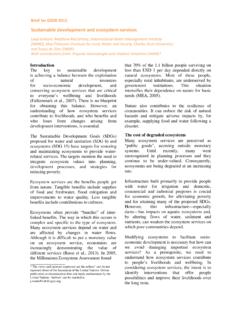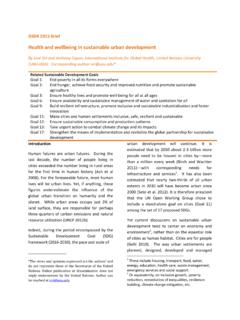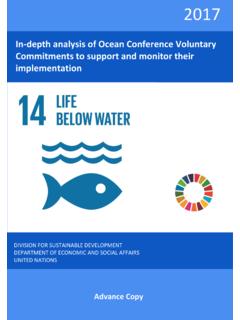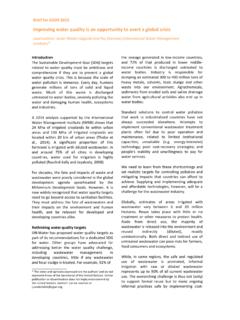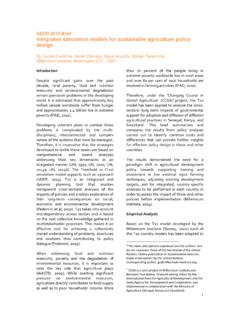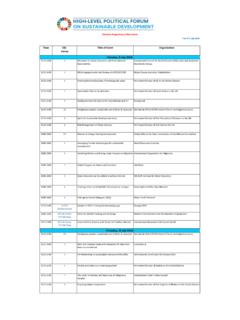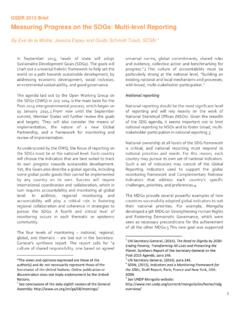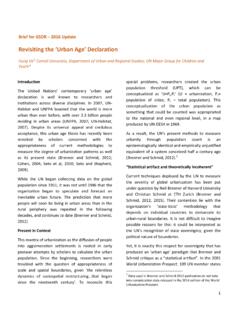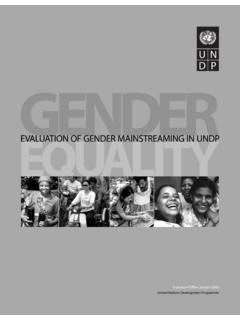Transcription of THE SUSTAINABLE DEVELOPMENT GOALS (SDGS) AND …
1 THE SUSTAINABLE DEVELOPMENT GOALS (SDGS) AND AFRICA S AGENDA 2063 2017 UN Women. All rights the report online at: Photos: i(am)woman campaign by (UN Women)Design: Dammsavage Inc. ACKNOWLEDGEMENTS UN Women wishes to acknowledge the participation of the following agencies who contributed to the success of the Regional Consultation on Agenda 2063 and the SUSTAINABLE DEVELOPMENT GOALS : the African Union Commission (AUC), the East African Community (EAC), Common Market for Eastern and Southern Africa (COMESA), Intergovernmental Authority on DEVELOPMENT (IGAD), Southern Africa DEVELOPMENT Community (SADC), Southern Africa DEVELOPMENT Community Parliamentary Forum (SADC PF) and regional Civil Societies. Four Member States participated including the Governments of Botswana, Rwanda, Uganda and Zimbabwe. We appreciate their participation and inputs into the SDG implementation processes. The consultation was conducted in partnership with the UN SDG Action Campaign, the United Nations Economic Commission for Africa (UNECA) and the United Nations DEVELOPMENT Programme (UNDP).
2 We appreciate the civil society through the Civil Society Advisory Group for their valuable input into the convening. Further, we wish to acknowledge the efforts of the Technical Planning Committee based at UN Women in managing a successful convening. In particular, we thank Funmi Balogun, Themba Kalua, Fionna Smyth, Jack Onyisi Abebe, Hulda Ouma and Tikikel gratefully acknowledge the overall leadership and guidance provided by Izeduwa Derex-Briggs, Regional Director for UN Women Eastern and Southern Africa, and Simone ellis Oluoch-Olunya, Deputy Regional Director in the organization and strategic visioning of the , would like to acknowledge the participation from UN Women Multi/ Country Offices including: Kenya, Ethiopia, Uganda, South Africa Multi-Country Office, Malawi, Botswana, Tanzania, Uganda and Zimbabwe. These valuable inputs have helped to shape the agenda of gender equality and empowerment of women and girls within the framework of the SDGs and Agenda 2063.
3 THE SUSTAINABLE DEVELOPMENT GOALS (SDGS) AND AFRICA S AGENDA 2063 Convening Report UN WOMEN EASTERN AND SOUTHERN AFRICAN airobi, April 2017 SDGs CONVENING REPORT2 ACRONYMS AND ABBREVIATIONS 3 EXECUTIVE SUMMARY 5 BACKGROUND 6 WELCOME REMARKS 7 SESSION 1: The 2016 Africa UN Human DEVELOPMENT Report: Accelerating gender Equality and Women s Empowerment in Africa 8 SESSION 2: The SDGs in Africa: The Role of the AU in the Implementation of the SDGs within the Framework of Agenda 2063 Implications for DEVELOPMENT thinking and Action Regionally and Nationally in Africa 9 SESSION 3: An Overview of the gender Equality Agenda within the Framework of the SDGs 12 SESSION 4: The Role of the UN Economic Commission for Africa in Advancing gender Equality within the Framework of the SDGs and Agenda 2063 14 SESSION 5: Mechanisms for Advancing the SDGs within the UN DEVELOPMENT System 15 TABLE OF CONTENTSSESSION 6: A Reflection by Sub Regional Intergovernmental and Inter-parliamentary Bodies on Lessons Learned in Advancing the gender -Related MDGs.
4 Showcasing Initiatives on Advancing GEWE in the SDGs, Opportunities and Challenges for SDG Implementation 16 SESSION 7: Panel Session on the Role of Civil Society in advancing Accountability on GEWE within the Framework of the SDGs 20 SESSION 8: National EffortS in Advancing GEWE within the SDGs at Country Level and Linkages with Regional Processes 22 SESSION 9: UN WOMEN S STRATEGIES FOR ADVANCING GEWE WITHIN THE FRAMEWORK OF THE SDGS 26 SESSION 10: Outlining a Pathway Document for Strengthened Regional Collaboration and Accelerated Action on Advancing gender Equality Gains Within the SDGs (To Support Member States and Promote Accountability) 27 CONCLUDING REMARKS 33 ANNEX 34 SDGs CONVENING REPORT3 LIST OF ACRONYMSAfDBAfrican DEVELOPMENT BankAUAfrican UnionAUC African Union CommissionBPfABeijing Declaration and Platform for ActionCEDAW Convention on the Elimination of All Forms of Discrimination Against WomenCOMESAC ommon Market for Eastern and Southern AfricaCSOC ivil Society OrganizationEACEast African CommunityESAROE astern and Southern Africa Regional OfficeGEWEG ender Equality and Women s EmpowermentIGADI ntergovernmental Authority on DEVELOPMENT M&Emonitoring and evaluationMDGsMillennium DEVELOPMENT GoalsNDPN ational DEVELOPMENT PlanRECR egional Economic CommunitySADCS outhern African DEVELOPMENT CommunitySADC-PFSADC Parliamentary Forum SGBV sexual and gender -based violence SDGsSustainable DEVELOPMENT GoalsUNUnited NationsUNDPU nited Nations DEVELOPMENT ProgramUNECAU nited Nations Economic Commission for AfricaUN WomenUnited Nations Entity for gender
5 Equality and the Empowerment of WomenSDGs CONVENING REPORT4 AGENDA 2063 THE AFRICA WE WANTSDGs CONVENING REPORT5 EXECUTIVE SUMMARY In December 8th and 9th, 2016, the Eastern and Southern Africa Regional Office (ESARO) of the United Nations Entity for gender Equality and the Empowerment of Women (UN Women) con-vened a regional consultation with partners to discuss the domestication and mainstreaming of the SUSTAINABLE DEVELOPMENT GOALS (SDGs) and the African Union (AU) strategic framework for socioeconomic DEVELOPMENT in Africa, commonly known as Agenda 2063. The convening was held at the Southern Sun Mayfair Hotel, Nairobi, Kenya. The consultation brought together representatives from Regional Intergovernmental and Inter-parliamentary Bodies,, governments, civil society organizations and United Nations agencies. It provided a platform for them to share lessons learned in advancing GEWE, discuss how to collectively operationalize the GEWE agenda within the SDGs and Agenda 2063, and strategize on how to facilitate greater accountability for GEWE within the DEVELOPMENT frameworks.
6 The consultation comprised several interactive presen-tations, panel discussions and moderated plenaries. On the first day, presenters and participants reflected on the lessons learned in the implementation of the MDGs and discussed enhanced opportunities the SDGs present for the realization of GEWE. The role of RECs in promoting and integrating DEVELOPMENT agendas was also discussed. On the second day, panelists and participants deliberated on the role of civil society in implementing the SDGs and Agenda 2063. Country initiatives on integrating the SDGs, Agenda 2063 and GEWE were presented. Participants also learned about UN Women s advocacy efforts in promoting the the meeting, participants identified various opportunities, strategies and areas of collaboration. They identified good practices in promoting GEWE within the various developmental frameworks as well as gaps in facilitating accountability on GEWE. The key output of the consultation was a pathway document for strengthened regional collaboration and accelerated action on advancing gender equality gains within the SDGs to support Member States and promote CONVENING REPORT6 BACKGROUNDIn order to localize the SDGs, it is important to ensure multi-stakeholder ownership.
7 State and non-state actors, sub regional Regional Intergovernmental and Inter-parliamentary Bodies, are all critical stakeholders in the DEVELOPMENT agenda. UN Regional Commissions, UN Women and other agencies assist governments to integrate the global SUSTAINABLE DEVELOPMENT agenda into their national DEVELOPMENT agendas. At the continental level, the AU is implementing Agenda 2063. Regional Intergovernmental and Inter-parliamentary Bodies, such as the East Africa Community (EAC), Common Market for Eastern and Southern Africa (COMESA), Intergovernmental Authority on DEVELOPMENT (IGAD), and the Southern Africa Devel-opment Community (SADC) are playing a critical role in implementing this agenda. RECs have a specialized role to play in integrating the SDGs and Agenda 2063 due to their universal coverage, convening power, intergovern-mental nature and strength, broad-based cross-sectoral mandate, and experience in mobilizing regional consensus on key intergovernmental agreements.
8 In order to strengthen the implementation of the SDGs, collaboration needs to be enhanced. UN Women, therefore, organized a consultation to enhance coher-ence and coordination among partners. The objectives of the consultation were threefold: To strengthen collective efforts to operationalize the gender equality agenda within the framework of the SDGs and Agenda 2063 in Africa and reinforce the roles and responsibilities of different actors at global, regional and national levels. To discuss key considerations for accelerated action on the gender equality agenda within the SDGs and Agenda 2063, understanding what has worked well and what has not. To understand global, regional and national benchmarking and reporting processes and at the RECs SDGs meeting in Kenya, 8/9 December, 2016. Photo- UN Women, Patterson SiemaSDGs CONVENING REPORT7 DAY ONE: 8 DECEMBER 2016 Welcome RemarksDr. Izeduwa Derex-Briggs, Regional Director of UN Women ESARO delivered the welcome remarks.
9 She recognized the presence of representatives from the African Union (AU), AU Member States, RECs and inter-parliamentary bodies, the UN Economic Commission for Africa (UNECA) and UNDP, civil society organiza-tions (CSOs), and UN Women country offices. The Regional Director said that strong evidence exists showing that investing in gender equality and women s empowerment is pivotal to reaching the GOALS of SUSTAINABLE DEVELOPMENT , including the aspirations of Africa s Agenda 2063, as well as the SDGs (also known as Agenda 2030). Dr. Derex-Briggs noted that Agenda 2063 complements the SDGs and builds on the various international and regional agreements affirming the GEWE agenda. She said that the integration of the SDG indicators and targets in the First Ten Year Imple-mentation Plan of Agenda 2063 is a significant and critical step towards promoting the monitoring and implementation of a gender -responsive DEVELOPMENT agenda and will facilitate the building of evidence on gender -responsive implementation for both Agenda 2030 and Agenda 2063.
10 Dr. Derex-Briggs highlighted the need to localize DEVELOPMENT agendas through an inclusive process driven by leadership at the continental, regional and national levels. The agenda should be owned not only by national governments but also by communities and CSOs that should hold governments accountable to their continental and global Regional Director emphasized the great poten-tial that RECs and interparliamentary bodies must facilitate the implementation of the SDGs by lever-aging their unique role at the subregional level and ensuring coherence in priority setting, planning and implementation. Their understanding of the needs of their subregions can help in mobilizing political will, commitment and coordinated actions and help national governments navigate the requirements of Agenda 2030 and Agenda 2063. Dr. Derex-Briggs shared an example where the role played by the AU Commission in securing commitment and accelerated action led to significantly reduced maternal mortality.
